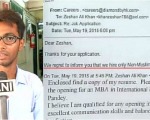

Discrimination Against Employing Muslims is Deep Rooted in Private Firms
Hari Krishna Exports, a diamond exporting firm in Mumbai, has stirred a hornetââ¬â¢s nest by refusing to entertain a Muslim candidateââ¬â¢s application for a job it advertised saying that it hired only non-Muslim candidates. It has also brought out in the open deep seated distrust that some have against the largest minority in the country. It is also against the law of the land which does not allow one to discriminate between citizens on the basis of caste, creed, community or religion. But this law is just on paper. In reality, most privately owned firms and companies just do not reply to candidates not belonging to their preferred caste, creed, community or religion. This way, they do not break the law in letter and no one can haul them up for it.
Should religion be a factor in deciding who will work for your company? Or shouldnââ¬â¢t education, experience and capability be the criteria? Although no such case has come to light in professionally managed and large corporates, small privately owned companies and firms are usually very selective in whom they call for job interviews. One has come across jewelers advertising for sales staff with the catch line ââ¬ÅMarwari or Gujarati candidates with good references preferred.ââ¬Â But it is the first time such blatant discrimination has been so bluntly communicated to a candidate in black and white. Hari Krishna Exports has tried to downplay the issue by saying that it was an error on part of a trainee, but it does not carry much conviction.
If a survey were to be carried out of privately owned Hindu firms and small companies, it will show that apart from the shop floor, a negligible number of Muslims are employed in such firms and companies. The reverse might be true for firms and companies owned by Muslims. They also do not employ Hindus in key positions. Does this mean that when Indians run a family business, they are more comfortable employing their ââ¬Åownââ¬Â people. Let us break this down further. Among the Marwaris, there are three categories: Agarwals, Maheshwaris and Oswals. It is generally seen that each category gives preference to its own when it comes to employing people in the top hierarchy.
When we were young, we never found any Muslims employed in positions that made them come in direct contact with family members in our family or in the families of any relatives and friends. Our only contact with Muslims then was in schools, clubs and restaurants and tailors and barbers. My immediate family was not so restrictive, as our family physician was an affable Muslim. We were like family and invited each other for all functions in our families. Maybe this was because my ancestors had crossed over from the erstwhile East Pakistan ââ¬" where they were in constant business and social touch with Muslims - in 1950. I remember the first time one of my brothers-in-law (now deceased) employed a Muslim chauffer, he was the subject of intense family scrutiny. But he, bless his soul, stuck to his decision and later employed one more.
The discrimination even found place in the way Muslims did business. For example, the community largely controls the wholesale fruit trade in Kolkata. But they had little or no presence in the retail markets. Fruit vendors are spread across Kolkata pavements as itinerant hawkers. Apart from a few Muslim dominated localities, it was difficult to spot Muslim fruit sellers even 15 years back. But times are changing. Now, Muslim vendors dominate the retail trade too. One can find them selling their wares on the pavements in solidly conservative Hindu dominated localities and they do not suffer for want of custom. In fashion retail, in small stores, Muslim boys and girls are now being employed in large numbers, although it is disturbing to note that they feel the need to change their names to the ubiquitous Pappu or Raju.
The kind of discrimination shown by Hari Krishna Exports still runs deep, but winds of change are blowing. Muslims form nearly 18 percent of our population and are highly skilled in several trades and crafts. Every Hindu bride that does the round of the sacred pyre at her wedding is clad in a lehnga that must have been toiled over by many a Muslim craftsman to give it its dazzling look. Muslims boys and girls are competing with the best in the country to become engineers, chartered accountants, lawyers, doctors, MBAââ¬â¢s, IAS and IPS officers and the like. It is in the interest of the majority community to embrace them as dedicated employees who can take their businesses to another level. Maybe people with a mental block cannot see the incongruity of sitting before a laptop and deciding on employees on the basis of caste, creed, community and religion. The sooner they realize their folly, the better for the unity and progress of India.
By Sunil Garodia
First publised on 2015-09-23 17:37:15











